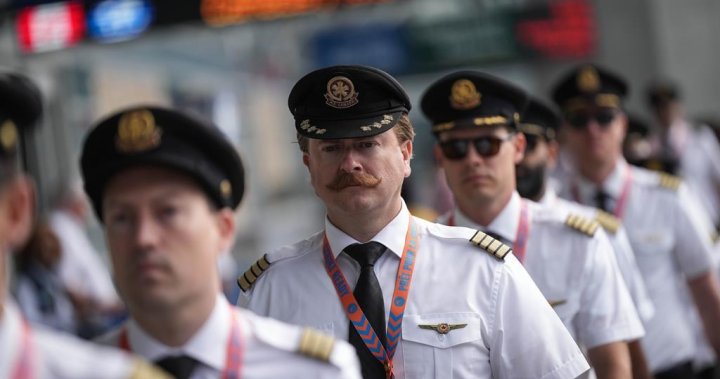[ad_1]
The head of the Air Canada pilots union says she’ll step down if members opt not to approve a tentative deal with the airline, raising the stakes as aviators mull whether to accept hefty salary gains or drive an even harder bargain.
Charlene Hudy, who chairs the Air Canada contingent of the Air Line Pilots Association, told her fellow employees in a virtual townhall Friday that she “will have no choice but to resign” if they vote down the would-be contract.
“If the membership votes no to this (tentative agreement), it would clearly indicate to the public, media, government and company that I no longer speak on your behalf,” she said in a question-and-answer session that followed the online gathering. The Canadian Press has obtained a copy of her statement and confirmed it with two pilots.
“If I stayed, it would be to your detriment,” Hudy said.
The contract, reached last weekend after more than a year of negotiations, averted a strike that would have seen some 670 flight cancellations and 110,000 passengers affected daily.
The deal would grant the carrier’s 5,400 pilots a cumulative wage hike of nearly 42 per cent over four years. The increase outstrips major gains won last year by pilots at the three biggest U.S. airlines, where pay bumps ranged between 34 and 40 per cent — albeit starting from a higher baseline.

Get weekly money news
Get expert insights, Q&A on markets, housing, inflation, and personal finance information delivered to you every Saturday.
Despite the big top-line figure, the agreement has faced scrutiny from some pilots, particularly more recent recruits who are unimpressed with the ongoing pay gap between newer employees and their more experienced colleagues.
Warnings about resignation by union officials are not unheard of and aim to drive home the merits of a tentative deal, says Michael Bjorge, who teaches history at Dalhousie University with a specialization industrial relations.
“Oftentimes in bargaining, especially when people have been at the table for a significant period of time, they just say, ‘this is the best we can get’ and they often honestly believe that,” Bjorge said.
“In reality, of course, you never really know what you can get until you push to the maximum.”
Under their current contract, pilots earn far less in their first four years at the company before enjoying a big wage hike starting in year five.
Some employees had been pushing to fully scrap the so-called “fixed rate” provision, where earnings stay flat regardless of the type of aircraft flown. (Typically, wages increase with the size of the plane.) But the proposed deal announced on Sept. 15 would merely cut the four-year period of lower pay to two years, according to a copy of the contract obtained by The Canadian Press.
Even in years three and four, wages would be substantially lower than in year five. The hourly rate jumps by nearly 40 per cent in the fifth year, a far greater leap than in any other period, the agreement shows.
On the assumption that pilots work roughly 75 hours per month — a common baseline in the industry — newer recruits would earn between $75,700 and $134,000 versus almost $187,000 in year five, and more than $367,000 for an experienced captain flying a Boeing 777.
Experts say well over a third of the carrier’s roughly 5,200 active pilots may earn entry-level wages following a recent hiring surge. Many come on board after lengthy careers at other airlines, rather than straight out of flight school.
Provisions around scheduling and quality of life will also factor into pilots’ considerations ahead of a ratification vote, poised to take place in the coming weeks.
“By the time they first start working, it’s often the time they’re having children. So if mom or dad’s going to be gone for significant periods of time, that’s really hard on families,” Bjorge said.
© 2024 The Canadian Press
[ad_2]
Source link




















